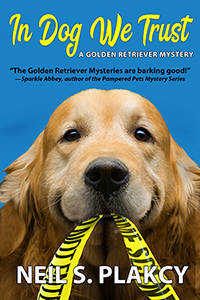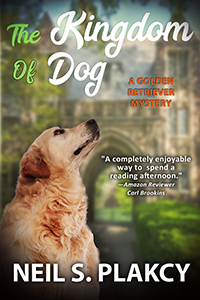
$4.99
In Dog We Trust
Santiago Santos sat down at my kitchen table to examine the audit trail on my laptop. One of the conditions of my computer use while on parole was the installation of keystroke software, which tells Santos, my parole officer, which keys have been pressed, and which windows they were pressed in. It captures emails, usernames, passwords and chat conversations, and only he has the password to see what’s been recorded.
While I made coffee for both of us, he looked at the log. “Computer looks fine,” he said, pushing it away as I brought two mugs to the table. In the Pennsylvania state parole system, officers visit parolees at their homes. I’d been to his office in Bensalem, for my first visit and to fill out paperwork, and he’d been out to my townhouse in Stewart’s Crossing once a month since then.
Like many computer hackers, I had little formal training. I had a bachelor’s and master’s degrees in English, but I’d never taken more than a couple of introductory courses in programming.
Yet I had a talent for it. I could sit down in front of a screen, hit a couple of keys, and find my way into even the most secure website. I never sent anyone a virus, and I never caused malicious mischief; all I ever wanted to do was find hidden data, explore protected directories, read confidential memos. It was knowledge I was after, not material gain.
Try convincing a judge of that.
My skills had brought me cash, an underground reputation—and a year’s sentence in a minimum-security prison. The corrections system in the state of California was operating at maximum capacity, so as a non-violent offender I was released after six months, with two years on parole.
By the age of forty, I’d lost my career, my marriage, and both my parents. So I’d left Silicon Valley and come back home, to Bucks County, PA, to regroup and start over. Just before his death, my father had moved to a townhouse in River Bend, a development on the edge of Stewart’s Crossing, and I took the place over when I was paroled.
One of the conditions of my parole was that I find a career that did not involve regular computer work. I was allowed to use the internet only to send and receive emails, to look for work, and other ordinary purposes—reading the New York Times, playing solitaire, and so on. Every time I turned on my computer, my fingers itched toward forbidden sites, but I held back, not least because of the tracking software.
“By the time I see you next month,” he said, “I want you to have a plan together for developing your business. How you’re going to exploit your contacts, build your client base. Financial projections for the next six months.”
I had avoided most people I knew before my conviction out of embarrassment, but the need to pay bills—and stay out of jail—is a powerful motivator. “I can do that.”
“Good. I’m not trying to be a hard-ass, Steve. I want you to succeed. But if you don’t have a plan in place, you’re going to fail. And you know what failure means, right?”
I knew. If I didn’t provide the means to support myself, the State of California would take over, returning me to that drafty cell at a state prison and three lousy meals a day.
Santos stood up. “Let’s say four weeks from today, same time, same station,” he said.
As soon as he left, I grabbed my parka and went out for a walk. The March weather had been cold, windy and damp for a week or more, and it was a struggle to motivate myself to keep up my regimen of morning and evening walks, part of my program to keep from sitting around the house brooding. That evening, though, I wanted to get outdoors and shake off the tension his visits always bring.
I often like to walk alongside the nature preserve that backs up against River Bend in the evening. There’s a long stretch between River Road and the guardhouse, and when I’m there I can imagine I’m in the midst of a wilderness instead of the middle of suburbia.
I waved at the old guy manning the gate, and then side-stepped a big pile of poop, left behind by a dog belonging to one of my neighbors. Probably one of those who ostentatiously carried plastic bags but never stooped to using one.
Many of my dog-owning neighbors liked to walk along the preserve, including my next-door neighbor, Caroline Kelly, who owned a golden retriever named Rochester. I guess the smells out there are more interesting than the ones on our street, even though it’s lined with maples and oaks and nearly every house has a dogwood or lilac tree or a flowerbed filled with the first daffodils and tulips of spring.
I was brooding about the ever-present possibility that I’d be sent back to prison when I heard three short bangs that sounded like someone was shooting off firecrackers, but without the whistle and the whine. The sounds stood out because the rest of the night was so silent—not even a distant siren or the roar of a motorcycle.
A fast-moving black SUV roared past me a moment later, skidding gravel. Rochester came galloping up toward me as soon as it had gone, the handle of his extension leash bouncing behind him the way a convict in a cartoon might drag his ball and chain.
I knew it was Rochester because of the madras bandana that Caroline kept slung around his neck. “Hey, boy, hey,” I said, reaching out to grab him. “Where’s your mom? How’d you get away from her?”
As soon as I had hold of his leash, Rochester executed a sharp 180-degree turn and started running back the way he’d come, this time dragging me along with him. “Rochester! Stop!” I called. “Sit, boy, sit!”
I’d never cared for Rochester. I guess it was clear to him that I didn’t like dogs, and he made it his personal mission to reinforce that opinion. He did a good job of it, too. He was too big, too enthusiastic, too shaggy. Whenever I stopped to talk to Caroline, Rochester tried to jump on me, and Caroline couldn’t keep him in line. She took him for obedience lessons every Saturday, but his exuberance still overwhelmed his manners.
He had huge paws and a big head. His fur was fine and attached itself to me if I even passed within five feet of him, giving my lint brush lots of use. He had big jowls, too, and there was usually a line of drool hanging from them he was happy to wipe off on me. His paws were often muddy, and somehow the tip of his tail was always wet, and when he whipped it against my leg it stung like the touch of a wasp.
Galloping down the street, he ignored my commands to stop, but quickly I saw why he was in such a hurry.
A narrow, grassed-over path from the access road into River Bend led off to an old Revolutionary War cemetery at the edge of the preserve. Caroline had told me she often took Rochester up that path, and cars used it to turn around when they realized they were approaching the entry to a gated community.
As I neared where the grassy path met the roadway, I saw Caroline Kelly lying on the ground. All the activity of the past few minutes formed into a pattern in my head—the shots fired, the speeding car, the loose dog. I looked around as adrenaline raced through my veins. Was the shooter still there? No, he or she must have left in the car that passed me.
I walked up to Caroline, and leaned down next to her. Blood seeped out of her jacket, and there was a growing pool next to her leg. I remembered learning in college biology that if the femoral artery, running through the thigh, was severed, you could bleed out in a matter of minutes.
“Caroline?” I asked. “Caroline, can you hear me?” I had no idea how to do CPR and I was worried I’d do the wrong thing, somehow hurt her further.
I watched for a minute but could not see any rise and fall in her chest. I flipped open my cell phone, my hands shaking, and found my friend Rick Stemper’s cell number. Rick was a police detective in Stewart’s Crossing, and I knew he’d tell me what I should do.
Share :
- Author
- Category
- Tags
Description
|
The debut of a new series with heart — and fur! 42-year-old Steve Levitan has lost everything that matters to him – his marriage, his home and his career. After finishing a brief prison term for computer hacking, he returns to his home town of Stewart’s Crossing, PA with his tail between his legs. With his parole officer peering over his shoulder, Steve begins a technical writing business and takes a part-time job as an adjunct professor of English at his alma mater, Eastern College. He reconnects with an old friend, the local police detective, hangs out at a coffee shop, and enjoys the natural beauty of Bucks County and the stimulating college environment. Starting over helps him numb the pain of all he’s lost, including the two unborn children his ex-wife miscarried before their divorce. The last thing he needs in his life is a shaggy, bossy golden retriever. But when his next-door neighbor, Caroline Kelly, is murdered, Steve becomes her dog’s temporary guardian. |
|
|
| Rochester seems determined to solve the mystery of Caroline’s death, digging up clues and pushing Steve to investigate. As they nose through Caroline’s past, her friends and her career searching for motives, the bond between man and dog grows.
But it’s only when Steve uncovers a connection between Caroline’s death and some uncomfortable situations between his students and his colleagues that Steve realizes that in order to save his own life, and the life of the dog he’s come to love, he’s going to have to come face to face with a killer with nothing left to lose. |
||
Only logged in customers who have purchased this product may leave a review.



Reviews
There are no reviews yet.